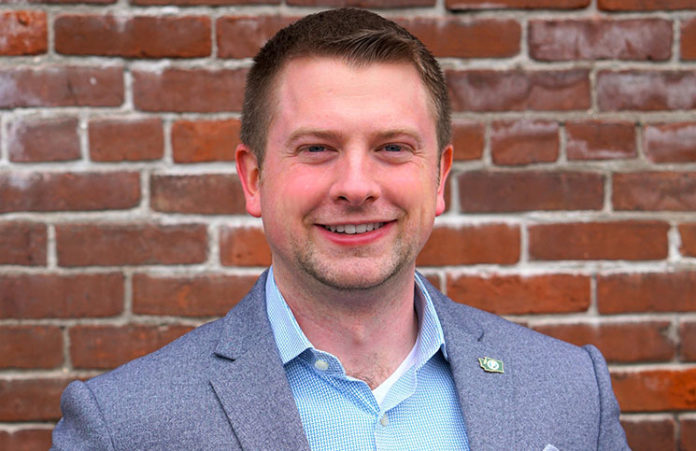Max Ault may have moved from interim director of the Columbia River Economic Development Council (CREDC) to a new job at Washington State University Vancouver this February, but the landscape he’s overlooking remains very familiar.
Ault, who joined CREDC in 2014 as the business development manager and ascended to ever-more important roles in the organization, spent the past five years working on business growth initiatives, assistance on expansion projects and outreach about those projects to the public and stakeholders. In his new gig with his alma mater, Ault will be working on similar projects, but this time he’ll be connecting all of the Washington State University campuses with businesses from the region and building new technology partnerships that should benefit both students and local economies, he said.
“I’m off to the races and there’s no shortage of things to do,” Ault said. “This is really an expansion of the work I was doing with CREDC. The position is system-wide, but also focused on the Vancouver and Portland area. The focus is experiential learning for students and faculty and research and engagement with the business community.”
Throughout his career, Ault has maintained close ties to Washington State University Vancouver, where he graduated with a bachelor’s degree in Public Administration in 2012. As part of that, he worked as assistant to the chancellor for community engagement from 2017 to 2018, while also carrying out his duties with CREDC.
Ault, who graduated from Hockinson High School, was also awarded the General George C. Marshall Public Leadership Award in 2017 for his economic development work with CREDC.
“The goal is to stitch everything together,” Ault said. “How do we connect the university system to work with everyone in the state of Washington? How does the university become the go-to resource for new and disruptive technologies?”
Ault has a lot of leeway to build through his new job. Washington State University only recently created the position of assistant vice chancellor for strategic partnerships after university leadership found a gap when developing its strategic plan, said Chancellor Mel Netzhammer.
“The way we engage with our community is hugely important,” Netzhammer said. “And as we were working on our strategic plan and looking at our goals around community engagement, we realized a lot of us had community partnerships in our portfolio, yet we didn’t have a single person addressing those partnerships.”
The new strategic plan was finalized in 2016, with a placeholder for the position until the right person could be found. Some objectives of the job are to provide broader research options for students, create technology partnerships, expand on student’s business knowledge and build technology transfer opportunities.
“We want to open some new doors where we have opportunities to connect researchers on campus with local businesses and organizations,” Netzhammer said.
After details of the job were finalized, WSU President Kirk Schulz came to visit Vancouver with Netzhammer to see how the university could get started by better integrating with Vancouver and Portland. That was when Schulz first met with Ault in his role as interim president of CREDC.
“I think first and foremost he is one of the most well connected individuals in this community,” Netzhammer said. “The opportunity to have him to connect in a more formal way our campus to the business community in the region was just a great opportunity that presented itself.”
Ault’s work will also dovetail with the university’s internship program, and he will help businesses and students connect for on-the-job experience and help with innovation.
“I think we’ll see experiential learning, more applied learning,” Netzhammer said. “We have the opportunity to be responsive to the workforce needs of our region. That’s something Max will be a connector on.”
One of Ault’s goals is to transform WSU into one of the top 25 research universities in the country. Different campuses will have different research focuses based on their expertise, such as health care for the Spokane campus or biotech and life sciences for the Vancouver campus.
“We have expertise in agricultural science, engineering, computer science, data analytics and pretty much everything else across the spectrum of research,” Ault said. “The Vancouver campus is actually more well-integrated than other campuses around the state, and that’s another area I’ll be working on.”
Some businesses are already talking to Ault about new possibilities, even though he’s only been on the job for a few weeks.
“So many that I’m running out of time in the day, actually,” Ault said with a laugh.
Projects could involve programs for master’s degree students to create intellectual property with local businesses, for university faculty to provide technology outreach and assistance to companies and to provide real work opportunities for students.
“It’s a linear process,” Ault said. “The point of engagement will be different for startup businesses than it will be for a company like Intel.”
One company he’s already talking to is WellHaven Pet Health, which he worked with while he was at CREDC. One natural partner for the company would be WSU’s Pullman campus College of Veterinary Medicine.
“One of the larger focuses of that is not just training, but also investing in professional development and teaching students how to run their own practices,” Ault said.
He also has several other irons in the fire, including working with WSU Vancouver’s Carson College of Business to provide some extra training and opportunities for student researchers that are generally more technology focused.
And that’s just the beginning, Netzhammer said.
“We’re looking forward to new opportunities that this position opens up in terms of partnerships with our community,” Netzhammer said.




